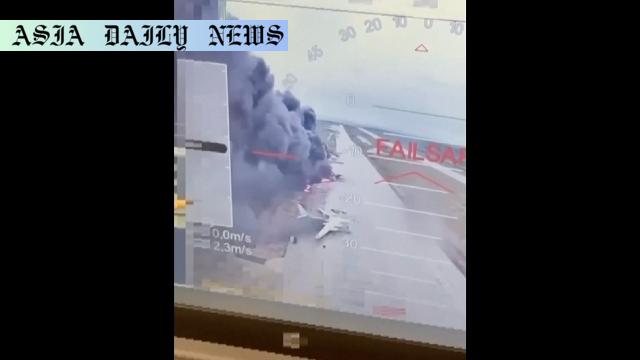Drone Strikes: Ukrainian security agency’s ‘Spider Web’ operation damages 41 aircraft on Russian airfields, causing $7B in losses.
Drone strikes damaged 41 aircraft on Russian airfields.
Ukraine’s ‘Spider Web’ operation targeted strategic assets.
The operation caused $7 billion in damage to Russia.
President Zelenskyy praised the historic mission.

Ukraine’s ‘Spider Web’ Mission: A Tactical Masterpiece
In a bold and unprecedented show of tactical ingenuity, Ukraine’s Security Service executed a meticulously planned operation named “Spider Web,” targeting Russian airfields and successfully damaging 41 aircraft. The operation, which took more than 18 months of preparation, reportedly used a unique method of smuggling drones into Russian territory via truck-mounted wooden mobile cabins. These concealed drones were remotely deployed to strike Russian airbases, including those housing strategic bombers, a move that has reportedly caused an estimated $7 billion in damage to Russian military assets.
The Ukrainian security forces were lauded for their precision and strategy. The operation’s scale involved multiple Russian regions, including the eastern Siberian region of Irkutsk and the northern region of Murmansk. Reports indicate that 34 percent of Russian strategic cruise missile carriers stationed at key airfields were affected in what has been called one of Ukraine’s most long-range operations to date. Ukrainian President Volodymyr Zelenskyy celebrated the success on social media, describing it as an operation worthy of its place in history books. The individuals involved in this critical mission were safely evacuated from Russian territory after the strikes.
Russia’s Acknowledgment and Immediate Reaction
Russia’s defense ministry acknowledged the attacks, confirming that several airfields were targeted and a number of aircraft caught fire. However, Moscow downplayed the impact by stating no casualties occurred and labeled the strikes as “terrorist attacks.” The ministry also claimed the detention of individuals allegedly involved in these missions. The governor of Irkutsk expressed particular concern, highlighting that the drone attack was the first of its kind in the Siberian region, which could signal rising vulnerabilities for Russian infrastructure.
Despite Moscow’s attempts to control the narrative, these attacks represent a significant blow to Russia’s strategic defense and airpower. The continued drone attacks suggest Ukraine’s increasing capability and reach, elevating the stakes in this ongoing conflict. These strikes serve as a stark reminder of the war’s evolving nature, forcing both sides to adapt to advancements in strategy and technology.
Historical and Strategic Significance
The ‘Spider Web’ operation marks a notable shift in Ukraine’s approach to countering Russian aggression. By taking the conflict deep into Russian territory, Ukraine has demonstrated not only its tactical ingenuity but also its ability to adapt to modern warfare. The success of this operation highlights the growing significance of drone technology in asymmetrical warfare. As traditional military systems face challenges, innovative strategies like these underline the need for agility and adaptability in the modern battlefield.
This strike also holds immense symbolic value, serving as both a psychological and strategic blow to Russia. By targeting crucial airbases, Ukraine has directly impacted Russia’s capacity to project airpower deep into Ukrainian territory. Beyond the operational impact, this mission reinforces Ukraine’s resolve to defend its sovereignty while showcasing the effectiveness of coordinated and well-planned military maneuvers.



Commentary
Strategic Innovation in Modern Conflict
The recent ‘Spider Web’ operation by Ukraine exemplifies a brilliant adaptation to the realities of modern warfare. With traditional military confrontations often stalled or met with heavy resistance, Ukraine’s use of advanced drone technology reflects a significant shift in strategic thinking. By smuggling drones in custom-built mobile cabins and deploying them directly on Russian soil, Ukrainian forces have demonstrated not only the effectiveness of unconventional tactics but also the ingenuity necessary for smaller nations to counter larger adversaries.
Psychological and Strategic Impacts
Beyond the visible economic and operational damage, the psychological impact of this operation on Russia is profound. The ability to strike deep within Russian territory and target vital military assets undermines the perception of Russian invulnerability. It sends a clear message of capability and resolve to both domestic and international audiences. For Ukraine, such operations are critical for maintaining morale and projecting strength, especially in an ongoing conflict where every tactical advantage counts.
The Future Implications of the ‘Spider Web’
Looking forward, the success of operations like these raises important questions about the evolving nature of warfare. The use of drones to neutralize strategic assets thousands of miles away sets a precedent for future conflicts, altering the landscape of national defense strategies. Nations across the world must take note of these developments, investing in counter-drone technologies and revisiting their existing security protocols. This operation not only reflects Ukraine’s resolve but also highlights a new era where innovative tactics redefine the art of war.
Ultimately, the ‘Spider Web’ mission underscores the enduring importance of creativity and adaptability in achieving military objectives. It is a testament to the determination of Ukraine to protect its sovereignty and reclaim its place on the global stage, offering a timely reminder of the unpredictable nature of modern geopolitics.